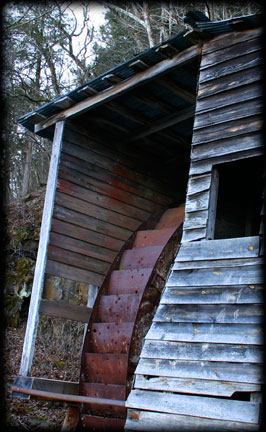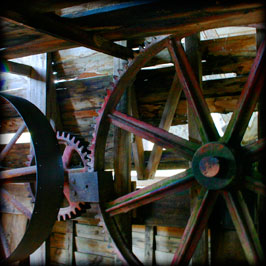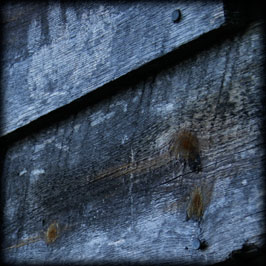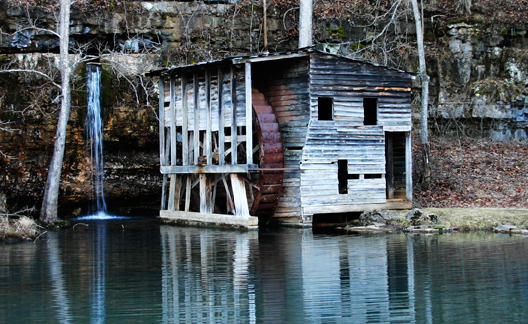Falling Spring Mill
by Joshua Heston
Looking like a weather-beaten and decidedly haphazard cracker box, it’s surprising to learn Falling Spring Mill is one of the youngest mills in the Ozarks.
The Falling Spring area was homesteaded in 1851 by Thomas and Jane Brown of Tennessee.
Today, the Thomas Brown Cabin sits across the lake from Falling Spring Mill.
In April of 1929, a great-niece of Thomas Brown — Dorothy Thompson — recorded this memory, as told by her grandfather, James Thompson:
We crossed the Mississippi River at what was called Green’s Old Ferry and we crossed the Ohio at what was called Golconda in an old horse boat.
In that company were 17 persons. They were the Brown Family and my mother’s two sisters (named Fowler) and the Reaser Family.
On reaching Missouri, the eldest brother, James M., shook hands with each of his brothers and sisters, bade them farewell, and departed northward, settling in the St. Joseph area.
The rest of the company continued to Oregon County.
It was not until 1927 that construction began on today’s Falling Spring Mill.
The overshot wheel (plate 1, 2) was brought up the Hurricane Creek from Johnson Spring.
Falling Spring Mill was a multi-purpose mill, using power from the aptly named Falling Spring directly behind (plate 1, 5).
The mill was used to grind corn, saw shingles and firewood, as well as generate electricity.
It was the 1920s, after all.
First constructed of timber, the building was later covered by sawboard siding (plate 4).
Today, Falling Spring Mill, the Thomas Brown Cabin, and surrounding property are maintained by Missouri’s state park system.
The site is located off Highway 19 in rural Oregon County south of Winona and north of the Eleven Point River.
February 19, 2009
— Historical information courtesy of the Mark Twain National Forest and the State of Missouri.
plate 1.

plate 2.

plate 3.

plate 4.

plate 5.




